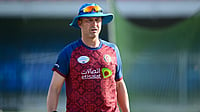Obsessive-Compulsive Disorder (OCD) is the fifth most disabling psychiatric condition but not many people seek treatment for it, experts said on Sunday. According to WHO, only about 35 per cent to 40 per cent of people suffering from the disorder seek therapy. The number of people who receive evidence-based treatment for the disorder is fewer than 10 per cent.
Obsessive-Compulsive Disorder (OCD) is twice as prevalent as schizophrenia and bipolar disorder and is the fourth most common psychiatric disorder, experts said. Throwing light on the reasons why not many people seek treatment for OCD, Dr Neelesh Tiwari, a neuropsychiatrist at World Brain Centre Hospital, Delhi, said the reason is a lack of awareness and understanding of the disorder.
"What is needed is spreading awareness about OCD among the public. Specific treatment strategies can help patients with OCD regain control over symptoms, functioning, and the quality of life." Dr Tiwary said treatment for OCD is very effective, and most people who receive treatment recover completely.
Depending on the severity, treatments range from a variety of medications to therapies. "In mild cases, it has been found that therapies, such as cognitive behavioural therapy, are sufficient. In more severe cases, medication is prescribed. Anti-depressants are commonly prescribed to help with relieving anxiety," Dr Tiwary said.
Obsessive-compulsive disorder can be identified by the presence of either obsessions or compulsions, or both. An intrusive and undesired pattern of thought, picture, or urge can be referred to as obsession. Obsessions have their roots in an individual's thinking. Compulsions are behaviours that a person engages in repeatedly as a result of feeling compelled to do so in response to an obsession. They are typically considered to be unreasonable or excessive by the individual, experts said.
According to Dr Nayamat Bawa, Head Psychologist, Iwill – ePsyClinic, "Sometimes diagnosing the obsessive-compulsive disorder can be difficult because its symptoms can be similar to those of other mental health illnesses. They can be detected by observing the compulsive behaviour of a person."
"Recent studies suggest that individuals who are more familiar with their diagnosis and have had previous interactions with mental health specialists are more likely to be receptive to considering other treatment options.
"On the other hand, a lack of understanding of the problem and a depressed mood may decrease an individual’s openness to seek treatment," Dr Bawa said.Dr Bhavna Barmi, Senior Psychologist at Fortis Escorts Health Institute said the two primary therapies for OCD are psychological treatment and medication. Cognitive behavioural therapy is a form of psychotherapy that many people who suffer from obsessive-compulsive disorder find helpful.
"You will learn how to resist the temptation to perform your obsessive rituals by being exposed to the feared object or obsession, such as dirt, as part of cognitive behavioural therapy. "A component of cognitive behavioural therapy is known as exposure and response prevention. Additionally, there are psychiatric medications that can assist in the management of OCD symptoms such as obsessions and compulsions," Dr Barmi said.
She said that people suffering from OCD may have experienced being cut off from others and alone. "You may assist persons who have the disorder in feeling supported and in obtaining the treatment they require by raising awareness of this problem. People should be educated about the realities of OCD," Dr Barmi added.
(With PTI inputs)


























